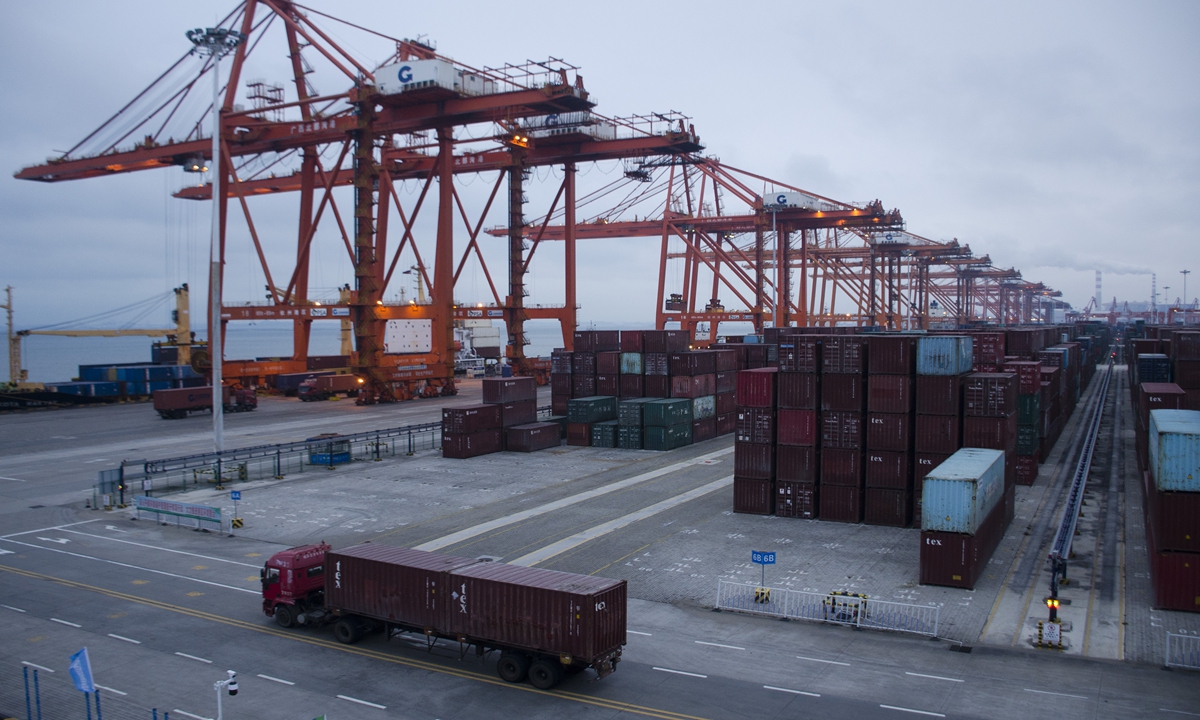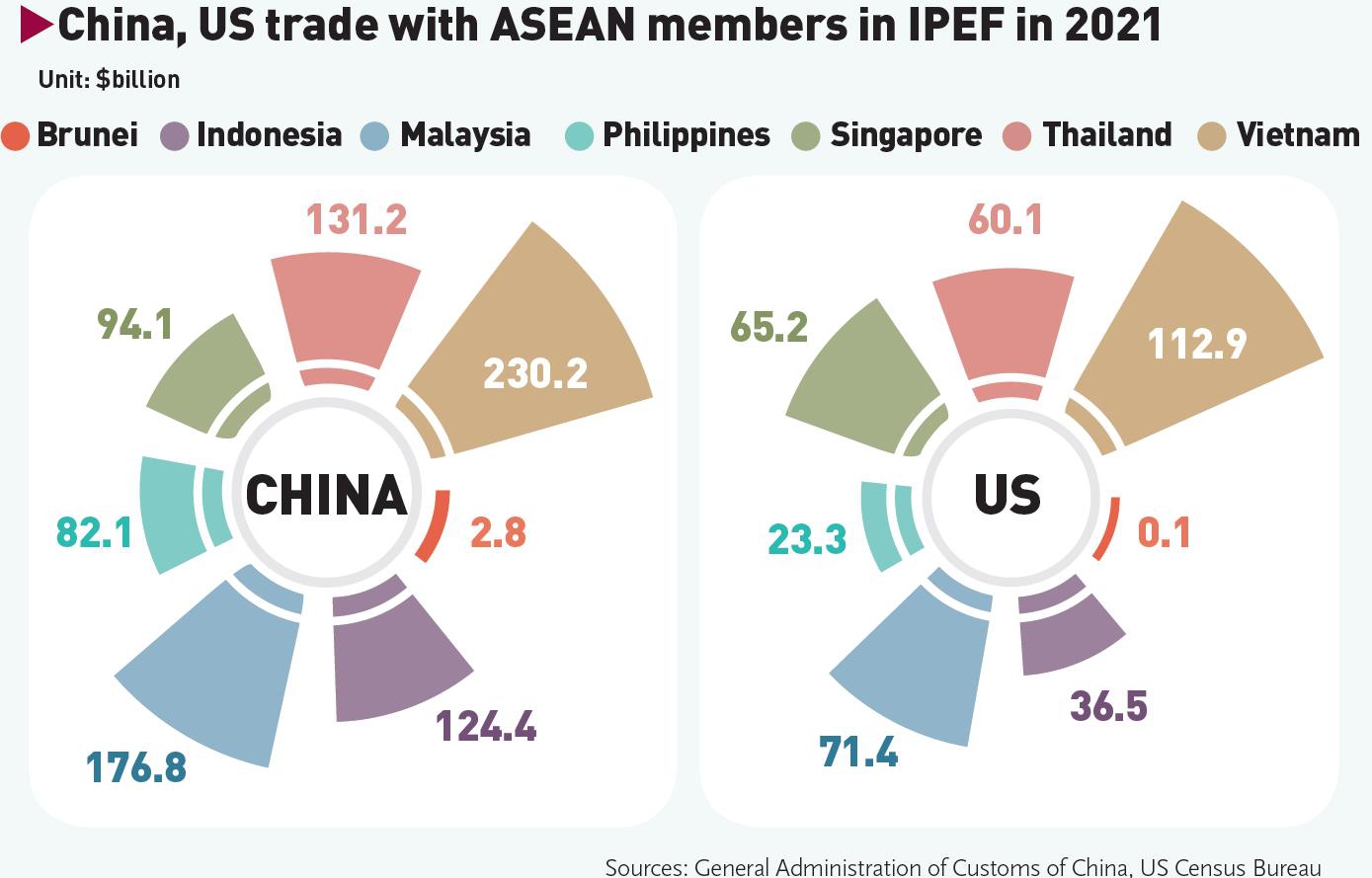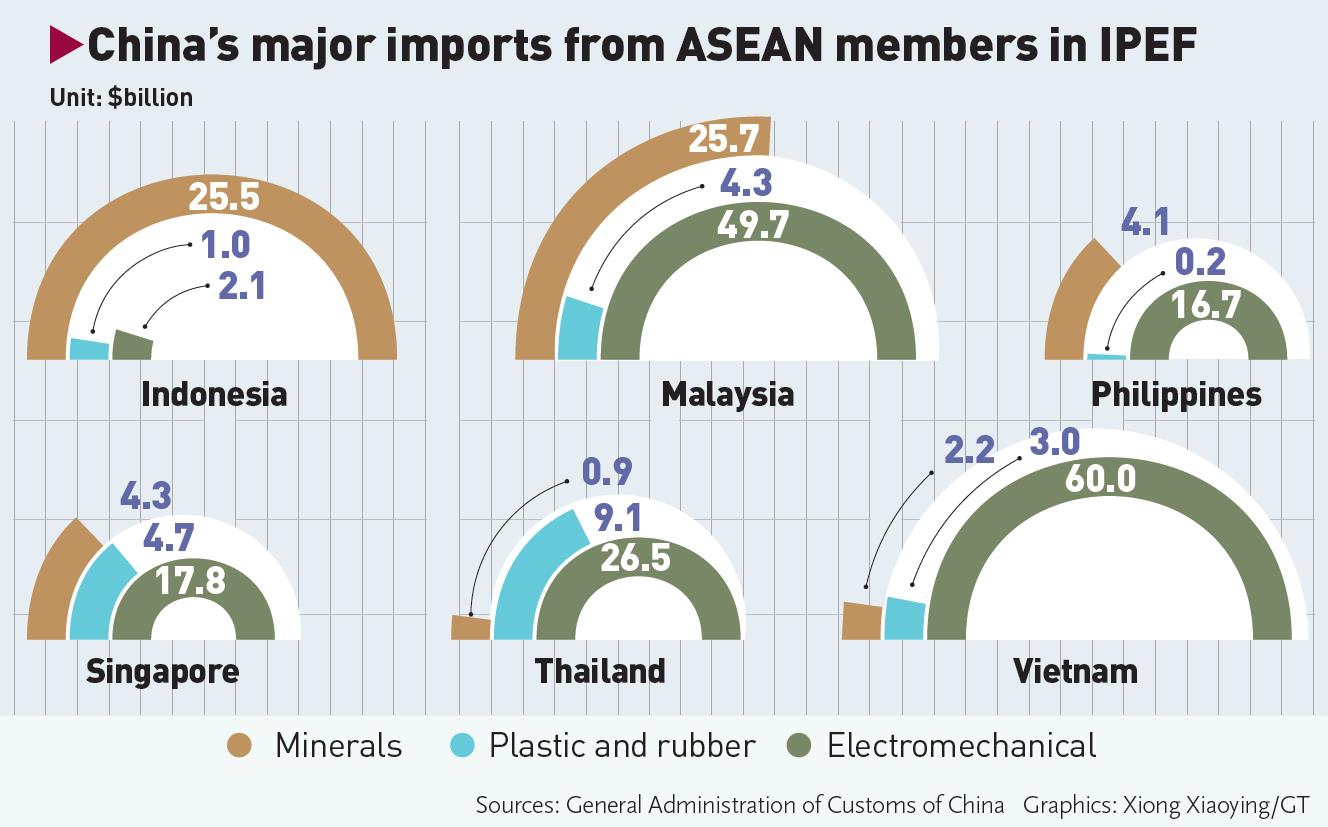
Photo taken on January 10, 2022 shows the container terminal of Qinzhou Port in Qinzhou, South China's Guangxi Zhuang Autonomous Region. Qinzhou vowed to build itself into a China-ASEAN trade and cooperation center and to be open to navigation to major ports in the world. Photo: VCG
The US' so-called Indo-Pacific Economic Framework (IPEF) seemingly got off to a rough start despite its high profile launch with 12 initial partners, as many participating countries, especially ASEAN members, stressed the need for inclusiveness and multilateralism in regional economic and trade cooperation, in a cautionary tone over the deal widely seen as a move against China.
Such a stance from leaders of several ASEAN members was also echoed by China's Ministry of Commerce (MOFCOM), which also called for openness and win-win approaches.
The economic success of the Asia-Pacific region has its roots in openness, cooperation and a win-win approach, and an inclusive and open stance, rather than one that is discriminatory and exclusive, the MOFCOM said in a statement on Tuesday.
It added that any new initiatives in the region should foster and promote economic cooperation and unity, rather than damaging and dismantling existing mechanisms. China always holds an open attitude toward regional economic cooperation initiatives that meet these criteria, the MOFCOM said.
Beyond China, reports of the launch of the IPEF by major media outlets in the region also highlighted various countries' emphasis on inclusiveness, multilateralism and cooperation.
Singapore's Prime Minister Lee Hsien Loong said in an interview with Nikkei Asia that the IPEF is not a free trade deal, and his country also welcomes China to join the Comprehensive and Progressive Agreement for Trans-Pacific Partnership (CPTPP), a high-standard free trade deal.
Vietnam's Prime Minister Pham Minh Chinh noted at the launch ceremony of the IPEF on Monday that "it is also necessary to uphold multilateralism and strengthen international solidarity on the basis of sincerity, trust and responsibility."
In Thailand, The Bangkok Post ran an opinion piece stating that "it [the IPEF] must be inclusive to promote economic cooperation, not as a disguised security bulwark against a third party."
Mohamed Azmin Ali, Malaysia's Minister of International Trade and Industry, tweeted that Malaysia's getting onboard with "the IPEF initiative… (is) a critical milestone in the trajectory of inclusive and progressive regional cooperation."
Chinese analysts said such responses from ASEAN members come as no surprise, as they set forth the principle that the nature of the IPEF should be non-exclusive and non-confrontational. Cooperation is dominant trend in Asia-Pacific, they noted.
Reading from these reports, it can be seen that ASEAN members are not saying no to the US, but in the meantime they are having second thoughts about the prospects of the US strategy, and taking a cautious stance, Xu Liping, director of the Center for Southeast Asian Studies at the Chinese Academy of Social Sciences in Beijing, told the Global Times on Tuesday.
The US and another 12 countries, which account for 40 percent of world GDP, announced the IPEF, a highlight of Biden's Asia trip, on Monday. The event preceded Biden's Quad summit in Japan on Tuesday.

China, US trade with ASEAN members in IPEF in 2021 Graphic: GT
Xu said that because the US-led strategy does not put the interests of ASEAN at its center, some ASEAN members may not be entirely willing members, despite the fact that they joined.
Xu noted that seen from disclosed information on how the IPEF works, it is not an equal deal, not even among its founding members, as countries have to negotiate terms with the US around the four pillars - specific areas of cooperation in digitalization, supply chains, clean energy and the so-called fair economy.
Analysts noted such an approach contrasts with China's stance on regional cooperation, which respects ASEAN's central role as shown in the RCEP trade pact, the world's largest free trade deal.
He Weiwen, a former senior trade official and a senior fellow of the Chongyang Institute for Financial Studies at the Renmin University of China, told the Global Times on Tuesday that seen from media reports, ASEAN members are taking roughly the same stance with China. He believed the IPEF is more of a geopolitical tool than an economic plan.
ASEAN members won't take sides between China and the US, simply because China is the center of regional trade, He said, pointing out that China's trade with the region is 2.5 times that of the US.
Trade among countries in the region accounts for about 55 percent of total trade, while trade with the US only accounts for 12 percent, according to He.

China's major imports from ASEAN members in IPEF in 2021 Graphic: GT
ASEAN remains China's largest trading partner, accounting for 14.6 percent of China's total foreign trade in the first four months of 2022, with the EU and the US ranking second and third, according to Chinese customs data released earlier in May.
In the January-April period, China-ASEAN trade totaled 1.84 trillion yuan ($274.5 billion), up 7.2 percent year-on-year.
Chen Jia, a research fellow at the International Monetary Institute of Renmin University of China, told the Global Times that the impact of the IPEF on the Asian economy is not clear yet.
"The IPEF now looks like a framework to be established in the long term, but it's a question whether it can live up to the time when Biden's term ends," Chen said, noting the uncertainty of the initiative and the scarcity of details.






